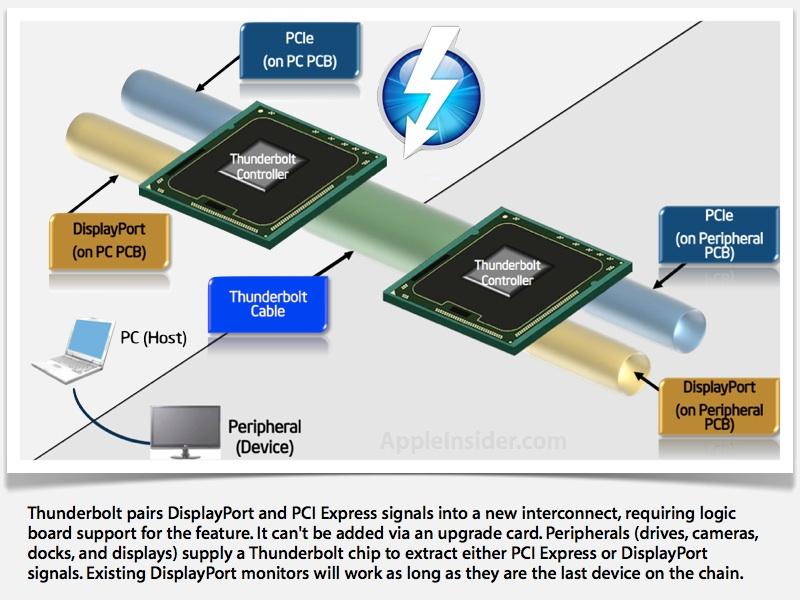Intel confirms current Thunderbolt Macs will support optical cables
Intel spokesman Dave Salvator indicated to Macworld that the current generation of MacBook Pros, iMacs, MacBook Airs and Mac Minis will be compatible with the upcoming cables. The company's original specification for the technology, which was codenamed Light Peak, was to use optical cables to reach speeds of 100 Gbps.
But, when the interconnect was unveiled in February, the chipmaker revealed that the technology would first use copper cables at speeds of 10 Gbps.
According to Salvator, circuitry will ensure compatibility of next-generation Thunderbolt cables with existing ports. Current Thunderbolt cables feature internal firmware and transceiver chips on each end. Optical cables could be longer, up to tens of meters in length, as opposed to the three-meter limit currently imposed on copper Thunderbolt cables.
However, Intel's spokesperson did not specifically mention whether the optical cables set to arrive next year will be faster than current cables. It's also not immediately clear whether the Thunderbolt chips in current Macs would be able to take advantage of optical cables with higher throughput.
Currently Apple is the only computer maker to offer Thunderbolt-equipped machines. But, Acer and Asus have promised to ship Thunderbolt-capable Windows PCs in the first half of 2012.
Thunderbolt peripherals that take advantage of faster optical cables may take some time to arrive, as Intel has warned that fiber optic technology will be substantially more expensive. Adoption will depend on consumers' speed requirements "versus how much they would be willing to pay," Dadi Perlmutter, executive vice president and general manager of the Intel Architecture Group, said during an interview at the Intel Developer Forum. According to Perlmutter, adoption could take years because of the cost limitations.
A range of products built to make use of Thunderbolt have slowly reached the market. In June, Pegasus released Thunderbolt-based RAID storage options starting at $999. Apple's Thunderbolt Display began shipping earlier this month. Last week, LaCie launched its Little Big Disk Thunderbolt hard drives, which start at $399.95 for 1TB.
 Josh Ong
Josh Ong











 Mike Wuerthele
Mike Wuerthele

 Malcolm Owen
Malcolm Owen
 Chip Loder
Chip Loder

 William Gallagher
William Gallagher
 Christine McKee
Christine McKee
 Michael Stroup
Michael Stroup







16 Comments
In other words we don't know what the maximum transfer rate of the ports would be with optical cables. I suspect that the only advantage will be the ability to use a longer cable.
Great news for digital editors. Well, as soon as FCPro X is up to speed
In other words we don't know what the maximum transfer rate of the ports would be with optical cables. I suspect that the only advantage will be the ability to use a longer cable.
Good catch. My understanding was the ports were to be upgraded when optical was ready not just the cable but I could be wrong. Perhaps the article is worded ambiguously. It will be a pisser if only later macs, as in still to come, support it
The data transfer speed is only limited by the capacity of the Thunderbolt chip/controller circuitry, as to what it can handle...the cables may handle much faster speeds, but you may need a Generation 2 Thunderbolt-equipped machine or card to be able to take full advantage of the faster throughput speeds, I don't know yet...
In other words we don't know what the maximum transfer rate of the ports would be with optical cables. I suspect that the only advantage will be the ability to use a longer cable.
Daaaaammmmnnn yooooouuu.......
No but seriously I was thinking sort of the same thing (but didn't get a comment up quite as fast). Wouldn't there still be a bandwidth limitation on the chip end? How long before higher bandwidth chips actually make their way into macs? We have no way of knowing how expensive higher bandwidth chips will be at this point which could be a big factor in whether or not Apple will implement them early on. I'm also wondering what the cost in cabling would be and if there will be any improvements in attaching multiple devices. Right now it's basically a single device kind of port (thunderbolt display isn't an option for everyone). Higher bandwidth would be excellent on laptops that only get a single port, especially if display resolutions continue to increase.